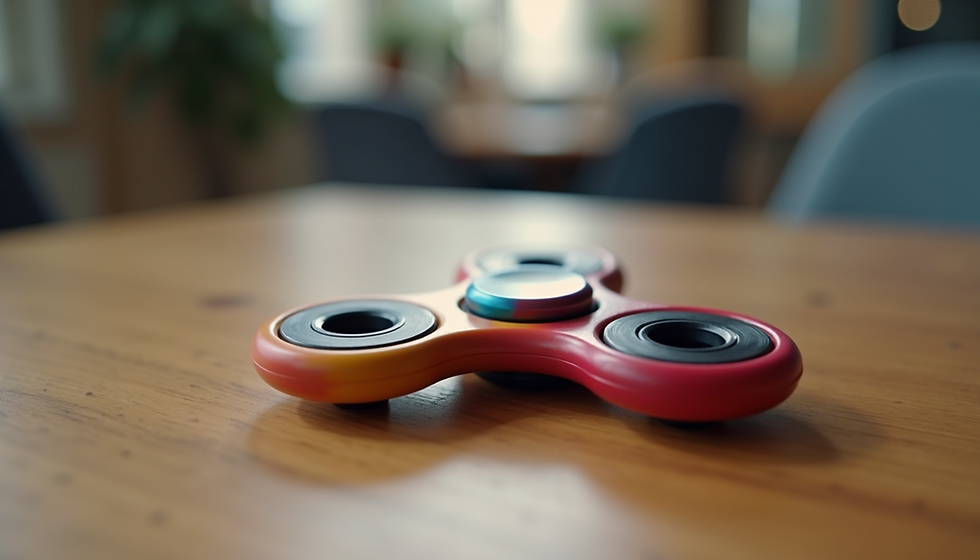The Benefits of Weighted Blankets for Children
- sensoryhaven4kids
- Sep 29, 2025
- 3 min read
Updated: Nov 3, 2025
Understanding Weighted Blankets
Weighted blankets are heavier than regular blankets and come in various weights. The weight is evenly distributed across the body, creating a calming effect. This concept is linked to a technique called Deep Touch Pressure (DPT), which has been shown to help people relax and reduce stress.
Weighted blankets are particularly beneficial for children with sensory processing disorders, autism, ADHD, and anxiety. However, they can also help any child who struggles to wind down or manage stress.
Improved Sleep Quality
One major benefit of weighted blankets is enhanced sleep quality. Many children have trouble falling asleep or staying asleep. The gentle pressure of a weighted blanket calms the nervous system, making it easier for children to relax and drift off.
Research suggests that using weighted blankets can lead to longer sleep duration and improved sleep quality. A study published in the Journal of Clinical Sleep Medicine found that 63% of children using weighted blankets experienced improvements in sleep quality. Kids often report feeling more rested upon waking, positively impacting their mood and behavior throughout the day.
Reducing Anxiety
Anxiety affects many children and can manifest as restlessness or irritability. Weighted blankets are a helpful tool for managing anxiety by providing a sense of comfort.
The pressure from the blanket can trigger the release of serotonin, a neurotransmitter that helps regulate mood. A survey by the Child Mind Institute noted that 70% of parents observed a decrease in their child's anxiety levels after using a weighted blanket. Many parents share stories of their children feeling calmer during stressful times, such as bedtime or transitioning between activities.
Sensory Processing Support
For children with sensory processing disorders, weighted blankets can provide significant help. These kids may feel overwhelmed by sensory input, leading to discomfort or anxiety. The deep pressure from a weighted blanket can help ground them, making it easier to navigate their environment.
Using a weighted blanket can create a safe haven for children sensitive to touch or noise. For example, during bedtime, it can help establish a calming environment that reduces anxiety associated with settling down for the night.
Encouraging Independence
Weighted blankets can also help children develop independence. For kids who feel anxious about being alone or afraid of the dark, a weighted blanket provides comfort and security, enabling them to sleep alone. This small step can make a big difference in fostering independence and self-soothing skills.
As kids rely on their weighted blankets for comfort, they may grow more confident in managing their feelings. This boost in self-confidence can enhance their self-esteem and resilience in facing challenges.
Choosing the Right Weighted Blanket
When selecting a weighted blanket for a child, consider the following aspects:
Weight: A good rule of thumb is to choose a blanket weighing about 10% of the child's body weight.
Material: Some children may prefer softer fabrics, while others might like a cooler, more breathable option. Ensure the blanket is machine washable for easy cleaning.
Getting your child's input during this process can also make them feel more involved and comfortable with their choice.
Safety Considerations
Although weighted blankets offer many benefits, safety is crucial. They are generally not recommended for children under three due to suffocation risks. Always supervise young children when using a weighted blanket and monitor its use.
Parents should also pay attention to their child's comfort level. If a child feels restricted or uncomfortable under the blanket, it may be too heavy or not suitable for them. Adjusting the weight or trying a different design may help.
Final Thoughts
Weighted blankets can be a valuable addition to improving sleep quality and reducing anxiety in children. They offer gentle pressure and a sense of safety, helping kids feel more relaxed. Whether your child faces sleep issues, anxiety, or sensory processing challenges, a weighted blanket may be a worthwhile solution.
Choosing the right blanket and using it safely are important. With the proper approach, weighted blankets can become supportive and comforting companions, promoting better sleep and overall well-being.
Additional Resources for Parents
If you're considering a weighted blanket for your child, I encourage you to explore various options available. There are many resources and communities that can provide support and guidance.
For more information on sensory products, visit Sensory Haven 4 Kids. They offer a range of carefully selected tools designed to help children manage sensory processing differences, anxiety, and autism.














Comments